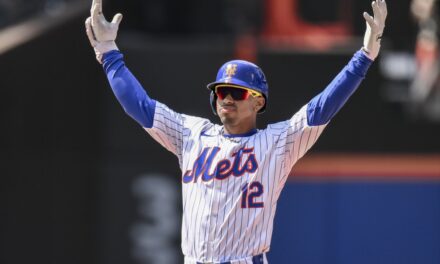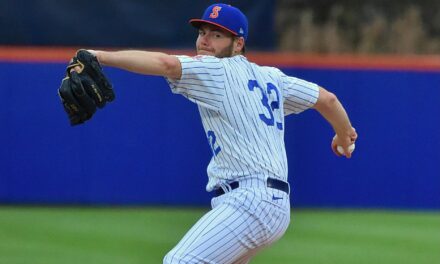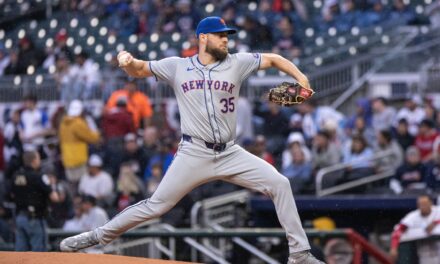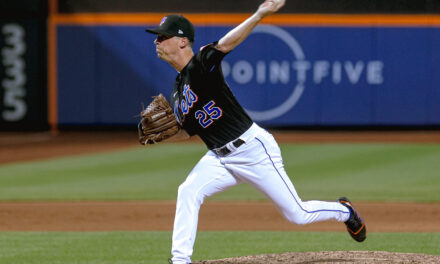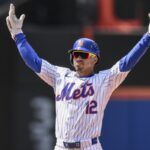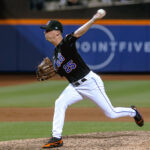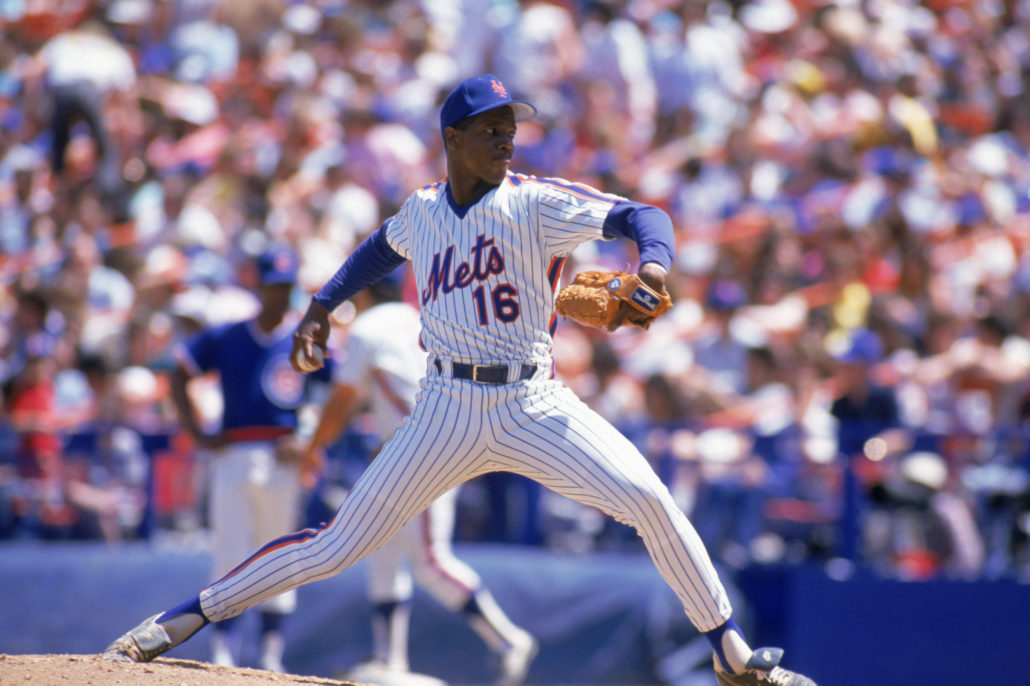
Throughout baseball history there are certain players who make a quick ascent to the majors, ready to dominate and live out a dream they’ve had since childhood.
These players are few and far between, as the maturity factor and lack of experience can instantly overwhelm young athletes.
Then there’s the case of Dwight Gooden.
Selected fifth overall by the New York Mets in the 1982 MLB Draft, Gooden made just 38 starts in the minors between 1982-83 before making the Opening Day roster in 1984.
At 19-years-old Gooden took New York by storm, posting a 17-9 record with a 2.60 ERA. The league was just not ready for what ‘Doc’ had in store, as Gooden led the National League in WHIP (1.073), strikeouts-per-nine (11.4), strikeouts (276), FIP (1.69) and bWAR for pitchers (5.5).
Gooden was named to the ’84 N.L. All-Star team, making him the youngest player to ever be named on an All-Star roster. He received 23 of 24 first-place votes to win N.L. Rookie of the Year, and finished second in the N.L. Cy Young voting behind the Chicago Cubs’ right-hander, Rick Sutcliffe.
Not bad for a kid who would be in his first year of college.
Gooden’s meteoric rise in ’84 made him the talk of baseball. However, after such an impressive rookie season, it was hard to expect Gooden to replicate such a brilliant opening to his career.
Replicate? No. Gooden’s 1985 season was flat out one of the most dominating and historic seasons in baseball history.
Since 1913, when the ER became official in both leagues, only two starting pitchers have posted a win/loss percentage of .800 or greater, an ERA under 1.60, and a Wins Above Replacement of at least 12.0: Walter Johnson in 1913 and Gooden in 1985.
Among starting pitchers under the age of 21 (age as of June 30), Gooden was just the 8th to toss 15 or more complete games and five or more shutouts in a season since 1901. He joined a list that included notable Hall of Famers in Christy Mathewson and the aforementioned Johnson.
In his sophomore season, Gooden was the best pitcher in baseball. At the tender of age of 20-years-old, Gooden led the majors in wins (24), ERA (1.53), strikeouts (268), FIP (2.13), ERA+ (229) and WAR for pitchers (12.2). At 20-years, 9 months, and 9 days old, Gooden became the youngest 20-game winner in baseball history.
No amount of adjectives could fully describe what Gooden was doing on the mound, as his starts became can’t miss events. Every time ‘Doc’ toed the rubber, fans in attendance, watching on TV or listening on the radio, were readying themselves for a multi-strikeout performance, a complete game shutout or all of the above.
His high strikeout performances led to fans starting the K Korner in the upper deck in left field at Shea, tracking each of Gooden’s victims with a white placard with a red letter “K” tracking each time Gooden struck a batter out.
By the time he was 22, Gooden was on top of the world. In a matter of three years, Gooden had been named N.L. Rookie of the Year won the N.L. Cy Young, N.L. Pitching Triple Crown and a World Series ring after the Mets beat the Red Sox in a Series for the ages in 1986.
Gooden spent eleven seasons with the Mets, posting a 3.10 ERA over 305 games (303 starts). Among all-time Mets, Gooden is second in wins (157), strikeouts (1,875), and bWAR for pitchers (41.6), while third in game starts (303), complete games (67) and innings pitched (2,169.2).
The well-documented off-field demons Gooden faced plagued his Hall of Fame trajectory, detouring him from becoming one of the greatest starting pitchers in baseball history. Speaking to Gooden on the matter, he looks back on his tenure in the game with pride, realizing the countless missteps he took along the way, though, appreciative of the career he amassed, and most importantly, the fans.
He glowingly speaks on how he fed off the fans’ energy and how they pushed him to the mental and physical limits to put on a great performance each time out on the mound. The support and love he’s received over the years does not go unnoticed to the 53-year-old, as his sincerity is evident when speaking to the Mets legend.
I had the privilege of speaking with Gooden prior to New Year’s, where we discussed his upbringing, an influential figure during his minor league days, his Mets tenure and his current health.
MMO: I saw that your grandson, Emiere, made the Baseball Factory Under Armour National Winter Invite. That’s got to be exciting for you to see your lineage continuing to play. What positions does he play and can you give a little scouting report on him?
Dwight: He’s a third baseman and a pitcher. It’s ironic that when I first started as a kid – I was younger than him, he just turned fourteen – I played third base and pitched. He’s bigger than I was at that time, we’re probably about the same height but I was a little skinny kid.
I was telling my son, Dwight Jr., ‘When a kid tells you something, don’t take it for granted because you never know.’
My mom told me that when I was a kid I told her one day that I’d be playing on TV. She didn’t pay much attention to it but it actually happened.
I’m not saying that he can walk on to make it because it’s very tough to get to that point. But he has passion for the game and he has a lot of potential, he works hard and he wants it. I’m pulling for him and I’m just trying to put him in the best position to succeed.
My son has done a hell of a job with him, a lot better job he’s doing with him than I did with my kids. Only because when my kids were younger besides one now, when they were younger playing sports I missed a lot of that because I was playing for the Mets. I missed the school activities and these games, so I tell my one son, ‘Be there as much as you can for him, it’s very important.’
MMO: Do you help coach him?
Dwight: Yes, I try to help him as much as I can. Just try to encourage him and emphasize to him that the way you become a better player is doing it on your own time. What I mean by that is doing extra work when there’s no practice and no games to take the time out, get away from the computers and Facebook and all of that, to go out and work on what your weaknesses are.
That’s what I try to instill into him. He’s doing very well, I’m very proud of him.
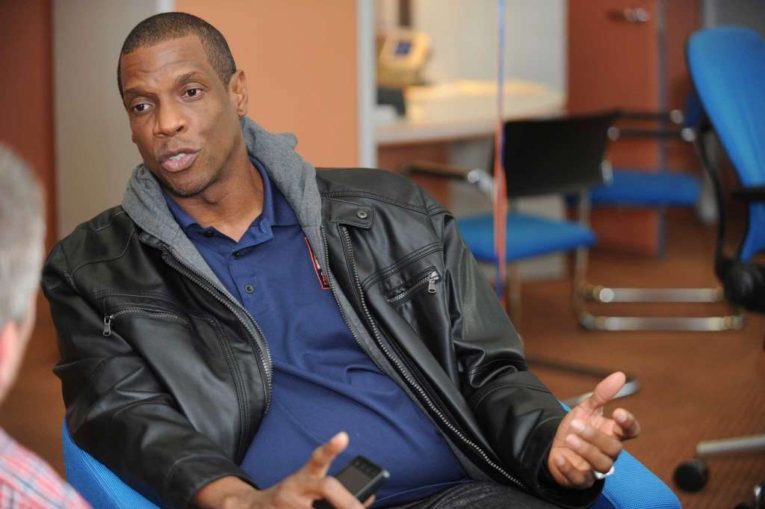
Greenwich Time
MMO: Who introduced you to the game of baseball and how did you fall in love with the sport?
Dwight: My dad, he was my hero. Growing up, Gary Sheffield – my nephew – basically grew up in the same house. Gary’s my nephew but he’s basically my little brother; we’re four years apart and my dad taught both of us the game at a very young age.
At that time in the ‘70s, you basically had one game a week on Saturdays [on TV] with Joe Garagiola. Growing up in Florida we got to see the Cincinnati Reds in spring training, they trained in Tampa at the time. We would also listen to Braves games on the radio and that was pretty much it. There was no MLB Network or ESPN like they have now, so my dad basically taught us the game.
A lot of times it was Saturdays when we were watching the games and he would quiz us, “What would you throw here?” And to Gary, “What would you look for here?” It’s like he knew I was going to be a pitcher and Gary was going to be a hitter. As a kid, you think your dad’s just asking you questions, but actually, he was giving us a lot of knowledge on hitters and pitchers.
One thing I regret before my dad passed away was asking him where he got his knowledge from because he had a lot of knowledge and was way ahead of his time. I can’t thank him enough for the career I had and the career Gary had.
MMO: Who were some of your favorite players growing up?
Dwight: My guys were Nolan Ryan, Tom Seaver, Pete Rose and Al Kaline. Those were my main guys.
I’ll tell you a quick story about Pete. We were watching spring training one time and Tampa to Lakeland is like going from Long Island to Citi Field. We followed the team to Lakeland when they were playing the Tigers and one game was a blowout, so we were leaving early. To me, baseball players are bigger than life, I would never ask for an autograph or anything like that. Not that I didn’t want it, but I was just too shy and afraid to ask.
We saw Pete Rose in the parking lot leaving the same time we were and my dad said, “There’s Pete Rose.”
So I waved my hand real quick and he waved and said, “Hey kid, how you doing?”
And I said, ‘Good.’
My dad asked him if we could get a picture, so we took a picture. Back then it was a Polaroid camera, so you took the picture and pulled it right out. We took the picture, and this is how Pete became my favorite because he was the first guy I got an autograph from and took a picture with.
Fast forward to 1984 when I make the team and we open the season in Cincinnati. I go out early to watch the Reds take batting practice because they were my team growing up watching as a kid. Pete Rose is the first guy that came over and said, “Congratulations on making the team.” I was telling him the story about how I took a picture with him, and he didn’t remember. Later that summer my dad came up and he had the picture blown up and I had Pete sign the picture for me.
Even today when I see Pete at different autograph signings or charity events I still get choked up because he’s my guy. And hopefully one day he gets in the Hall of Fame.
MMO: That’s a very cool story. Those are the type of moments that stick with you forever and leave a lasting impact, especially at a young age.
Dwight: Oh definitely, one-hundred percent. And that’s what it’s all about and I carry that today with me. I tell this every time I speak to kids; speak to everybody because you never know the impact you can have on a kid, just like the impact Pete had on me as a kid. Say Pete may have been nasty to me, I might never have been a baseball player.
MMO: How and when did you first earn the nickname ‘Doc’?
Dwight: It actually came when I was about eleven or twelve-years-old. My dad’s best friend was a doctor, and he was always telling my dad that one day he was going to make me a doctor. Every time I was pitching a Little League or high school game he would come and for whatever strange reason my dad’s friend would come up to the fence when I had two strikes on the batter and say, “Come on, Doc. Operate on him, Doc. You’ve got a patient, Doc.”
One day there was a news guy from the Tampa Tribune, Tom McEwen, and he was doing a story as my dad’s friend was going through the whole thing, “Come on Doc, operate on him, Doc.” He started writing, “Dwight Gooden, The Doctor”. Then my teammates started calling me ‘Doc’ as a joke and it kind of stuck.
Once I signed with the Mets mostly all professional players give you nicknames and they called me ‘Goody.’ I’ll never forget, I looked at them and said, ‘Goody? No, I like it when they call me Doc.’
‘Doc’ sounded better than ‘Goody,’ so that’s how ‘Doc’ came about.
MMO: What do you remember most from the 1982 MLB Draft, being selected fifth overall by the Mets?
Dwight: We went to the Tampa Tribune. We got invited: me, Richie Monteleone and Lance McCullers, whose son now pitches for the Houston Astros. Those guys in the scouting reports were supposed to be ahead of me. My high school coach said I’d probably go between the fifth and tenth round because I had only really played my junior and senior year. I had no idea I was going to go in the first round, I had never talked to a scout or anyone from the Mets organization.
When the draft started obviously Shawon Dunston went number one which I saw. Then number five: Dwight Gooden, New York Mets. I was like, no way! I had Tom McEwen – the same guy that wrote the [Doc] story on me – call New York. To call the Mets and make sure that was right because I just didn’t believe it based on what my coach had told me. He said, “No, you’re the Mets’ number one pick. Fifth overall.”
I could not believe it and I remember it was a small community and all the news trucks were there [at Gooden’s house]. To me it was overwhelming, but it was great for the whole neighborhood.
MMO: So you had no idea that the Mets were looking to take you so high?
Dwight: No, not that high. I talked to a lot of scouts and a lot of teams that would come by my school and have me throw and have me hit. But nobody ever said we’re going to take you if you’re available. I never talked with anyone from the Mets. Once I was drafted I talked to Joe McIlvaine, who was a scout at the time and he said, “We saw you play, we saw you play outfield. We had our sights on you the whole time.”
I had never talked to anybody from the Mets [prior]. I talked to the Reds a lot, I went to a lot of Reds’ tryout camps. I went to a lot of those because they were right there in Tampa. But they never said where they were going to take me, I figured I would get drafted but I didn’t think I’d go that high.
MMO: I read that your minor league pitching coach, John Cumberland, was instrumental in your development in the minors. Is that true?
Dwight: I owe him a lot of credit because without him who knows what could’ve happened, especially moving forward in ’83 and ’84. And what I mean by that is in ’83 I started out 0-3. I would not pitch inside because in high school I hit a kid in the head and that just scared me ever since. It knocked him out and the paramedics came out onto the field to take him off, so I wouldn’t pitch inside.
Guys were hitting me pretty hard and after my first three starts they were talking about sending me down to Low-A and John Cumberland said, “No. We’ll have him miss a start and I’ll work with him and then we’ll go from there.”
We didn’t really work on anything, we just talked, we talked about pitching and pitching inside. All he told me was, “If a guy hits a ball hard off you the next guy I want you to throw high and tight, back him off the plate. If a guy hits a home run off of you, the next guy I want you to drill him; hit him in his leg or somewhere below the belt.” He told me if I didn’t do that then they would send me down.
Just by pitching inside after starting 0-3, I end up 19-4 with 300 strikeouts and next year I’m in the big leagues. Having not had that talk and not missed that start who knows what could’ve turned out or what could’ve happened if I had got sent down to Low-A that year.
I owe John Cumberland a lot of credit.
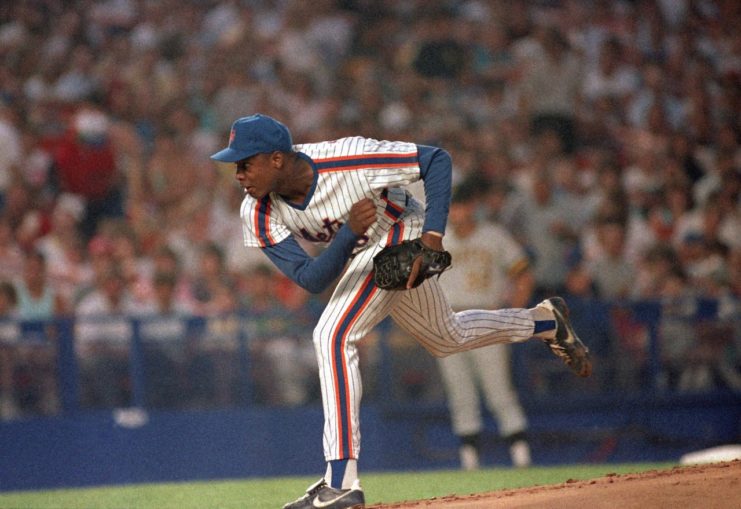
MMO: April 7, 1984: your major league debut. What memories stand out most from that day for you?
Dwight: I think the best thing about that was the Mets flew my parents into Houston and put them up in a hotel. I was the youngest kid of five by thirteen years so my parents were basically my security blanket. Having them there in the stands for my first game meant a lot to me and I thank the Mets a lot for that.
That day I was so nervous and had so much anxiety. I had breakfast with my parents. It was a night game so the bus didn’t leave until 5 PM.
At around 2 PM I just couldn’t take it anymore so I asked the concierge, ‘How far was the stadium? Where is the Astrodome?’ He gave me directions and I ended up walking to the Dome.
Never being there before and not knowing how to get in, I asked the guy at the gate how to get in. He didn’t have any idea so I ended up climbing the fence. It was like an eight-foot fence, this is a true story. I climbed an eight-foot fence and then the security guard saw me and asked, “Who are you, what are you doing?”
I showed my license and told them I was the starting pitcher tonight, and they were like, yeah right, whatever. They called the front office and they said, yes, he’s fine. So they let me in.
I remember warming up in the bullpen just sweating bullets, so nervous with my knees shaking. Mel Stottlemyre was my pitching coach and he said, “Just relax. Just throw the ball like in spring training.”
Those were good encouraging words but you knew it wasn’t spring training and this is the real deal. This is something I wanted to do since I was eight-years-old and now I had the opportunity. Not only that, but I remembered that two years ago I was in high school pretending to be these guys that I’m getting ready to face.
I pitched and went five innings and we ended up winning, 3-2. After the game, my dad said, “So son, what did you think?”
I said, ‘Well, I think I should win a lot of games.’
But then my next start against Chicago I got knocked out in the fourth inning and he asked me the same question, “Son, what do you think?”
I said, ‘I don’t know if I’m ready or not.’
That’s how the game humbles you. I didn’t think I belonged until probably once I made the All-Star team. That’s when I knew I should have a pretty good career and things would be okay.
MMO: That ’84 season was sensational, as you led the National League in WHIP, SO/9, FIP and bWAR for pitchers. At 19-years-old, winning Rookie of the Year and being viewed as the ace for a team with championship aspirations, what was that pressure like for you that season?
Dwight: I think one thing that really helped was having my dad. He coached a semi-pro baseball team in Tampa and also softball and stuff like that. Being around older guys even though, they took it easy on me obviously playing softball and stuff. But playing with older guys – it wasn’t Pete Rose and Mike Schmidt – but I think being a young guy of ten or eleven-years-old playing against grown men helped a little and took some of the edge off.
Still, there’s nothing like playing in the majors. I think Keith Hernandez was a big influence, Mike Torrez, Mookie Wilson, George Foster; all of these guys helped me a lot. Just taught me about having confidence in my ability and not to look at the names on the back of the jerseys. It’s little things that might sound cheesy but they played a big role in my confidence because I was very nervous.
As you said, 19-years-old, a year and a half out of high school and playing in the major leagues in New York City is just tremendous. Plus the fans gave me so much energy, so they helped a lot with the confidence.
MMO: Only two players have ever had a season with the following numbers since 1913: a sub-1.60 ERA, a win-loss record of .800 or better, and a WAR of 12.0 or greater. Walter Johnson in 1913 and yourself in 1985. Talk a little about that 1985 season, everything just seemed to go right for you that year.
Dwight: Thanks for that trivia. I didn’t even know that! Being there with Walter Johnson is amazing! One thing was in the All-Star Game in 1984 I came into the game as a reliever. I struck out the three batters and Gary Carter was my catcher, not knowing we were going to trade for Gary that November.
Having Gary in 1985 after the ’84 season I had and having Keith Hernandez there who I leaned on a lot [was big]. But having an All-Star catcher, a veteran catcher that loved the game and was going to get the best out of your abilities every single night played a HUGE part of my success in 1985.
I also remember probably after about 10 starts in 1985, I knew at that point that each start was bigger than just a regular game. I mean, there were more people, and not to toot my own horn but there were just more fans in the stands, more media coverage.
Everybody was coming to see my performance that night. And now, not to disrespect any player I played against, but if we scored 2-3 runs I wanted to be on the mound as much as possible because it was almost like being at a concert. Guys wanted to see a shutout, they wanted to see 10 plus strikeouts; they wanted to see a dominant performance. Not just a win where you win 5-2 with five strikeouts in seven innings, they wanted the whole package and I wanted to give them the whole package.
I put added pressure on myself. I wasn’t disrespecting the other players on the other team, I just felt the fans were there to see a performance and I wanted to give them the whole event. That’s what motivated me every start.
MMO: Your 1986 team is forever beloved and is one of the greatest teams of all-time. To you, what made that team so dominating?
Dwight: I think what made that team so dominating were the coaches we had. We’re viewed by a lot of people as a wild bunch, and we had some characters on the team but also we had a lot of baseball knowledge.
We had a lot of guys, especially on Sundays at Shea Stadium where the traffic would be so bad after games that we’d hang around and just talk baseball. If guys made mistakes or had something to say, we’d talk about it and it was over with.
Everybody just had fun, it was great and I loved it.
MMO: You mentioned that Nolan Ryan was one of your idols growing up, so where does Game 5 of the N.L.C.S. against Houston and Nolan Ryan rank for you in your career?
Dwight: That’s definitely top-2 or top-3. Going against my idol, going ten innings in a game like that was a tremendous, tremendous part of my career.
MMO: Who were the toughest hitters you faced?
Dwight: I’d say the toughest hitter was probably Barry Bonds, but the guy that gave me the most trouble was Chili Davis.
When Chili Davis was with the San Francisco Giants I could not get that guy out. It didn’t matter if it was one of my top performances with my best stuff or just a regular game, I could not get him out. I would just try to make sure that I got the guys out in front of him so no one was on base. I would try to throw inside on him and try to intimidate him but it didn’t matter, I just couldn’t get him out.
He just owned me.

MMO: May 14, 1996, you tossed a no-hitter at Yankee Stadium. After being suspended for parts of the 1994 season and all of ’95, did you ever think you’d be back in baseball? And what did that moment mean for you to get that second chance?
Dwight: I was working out the whole ’95 season while I was suspended and some scouts were coming around, but there wasn’t really much going on. I didn’t know if I was going to get an opportunity again to see if I can [play].
Fortunately, Mr. Steinbrenner gave me an opportunity to continue my career in New York, which I wanted to do. I obviously wanted to finish with the Mets but I understood why we went our separate ways.
When the Yankees gave me the opportunity to come back to New York that year I started out 0-3. The first thing I thought was, ‘Oh, here we go again.’ If you ever heard of a pitcher getting benched that meant you didn’t get to pitch in games if we were up 10 runs or if we were down 10 runs. I would just hang in the bullpen not knowing if I was going to get released, sent down to Triple-A, what have you.
Unfortunately, my good friend David Cone got an aneurysm in his arm and that got me back into the rotation. My third start back into the rotation was my no-hitter. What made that night so special besides being at Yankee Stadium, a no-hitter, and the history, was I was supposed to be home that day because my dad was having open-heart surgery the next day because of his health. He had been on dialysis for fifteen years and his health was failing him.
I had my plane ticket to go home and that morning I just thought, He’d probably want me to pitch.
I called Joe Torre and said, ‘I’m coming in to pitch.’
He told me, “No, go home. Take as much time as you need with your father.”
I told him, ‘No, I’ll be there tonight.’
I called my mom and she didn’t take it as well so I ended up hanging the phone up on my mother because I just felt guilty of not going home to be with my father.
The first three innings of that game I was standing in the walkway between the dugout and the clubhouse wondering if I had made the right decision or not. Not until the sixth inning is when I realized that I had a no-hitter. I looked up at the scoreboard to see the hitters I was going to face the next inning and I see no runs and no hits. Your heart beats a little faster and the anxiety starts kicking in. I was able to focus in but Seattle had what I thought was the best offense in baseball.
Once I threw the no-hitter, the game’s over and I go home and the next day I gave him [Dad] the ball. It turns out the doctor said that he did see the game, but he never made it home from the hospital, he ended up passing away. But the last game he ever saw me pitch was that no-hitter, so that made it that much special.
MMO: That’s an incredible story. It must have made you happy that your father got to see you pitch that final game.
Dwight: Yes, definitely. It’s amazing how things happen sometimes. To me, that was like a gift to him for all the hard work he put in. The sacrifices he made coming home from work every day and taking me and Gary to work on our game to make us players to live out our dreams.
MMO: You went from being a power pitcher with the Mets to relying more on location, off-speed pitches, and guile later in your career. How difficult was that transition for you?
Dwight: The thing that made it tough was in the beginning. Some nights you feel like you have a good fastball and when you have that you feel like going back to the pitcher that you were in the ‘80s. But that wasn’t the pitcher I was anymore. And to have Stottlemyre as my pitching coach there – who was also there at the beginning of my career – made the transition easier.
Not that it was easy but it definitely helped me just accept who I was. I wouldn’t say I didn’t miss striking out ten to fourteen batters, but I became more of a student of the game. You had to study the hitters more, learn their weaknesses and each pitch meant something where after every game I was more mentally tired just as physically because each pitch you had to know what the purpose behind it was.
Earlier in my career when I fell behind 2-0 to a batter I just reared back and threw as hard as I could to challenge guys. It was more of a challenge but it was all fun, but Stottlemyre definitely helped make that transition a lot easier.
MMO: When you look back on your career, Doc, what are you most proud of?
Dwight: I think the thing I’m most proud of is that I think I learned to accept the career I had. I’m very thankful and knowing that the fans love me for a person just as much as a player. And I say that because when I first made it to the majors my goal was to stay healthy, play as long as I can and hopefully win a World Series. I never thought about winning any individual awards. I was fortunate and very blessed along the way to win just about every award, pitch to win, that ’85 season, win three World Series with both New York teams.
By then the writers started saying he should’ve been a Hall of Famer. So I started thinking that and put a lot of pressure on myself and I started thinking about all the trouble I got in off the field. One day I told myself, Who am I to say what career I had based off of what someone else said? I basically won three World Series, had some of the greatest people supporting me on and off the field, played with two great organizations and I lived my dream.
I had an unbelievable career and once I saw it that way, understood it, and accepted that it made it that much better. A lot of times, even now, it gives me goosebumps thinking about it. Sometimes I still put in tapes and watch and say, ‘Wow, that was great.’
I really enjoyed the career that I had and the thing I enjoyed the most about it was developing friendships with the players I played with and the organizations. And the fans, I can’t thank the fans enough. They gave me the strength to carry on even when I didn’t feel like it.
MMO: How’s your relationship with your former teammate, Darryl Strawberry? You both had a public feud dating back to August of 2016, how have you guys been?
Dwight: Our relationship is good now. I think it’s more about respect and understanding that if we have a problem with one another that we confront each other about it instead of going public.
We talk now probably more regularly than we did and I think the conversations are more real. It still bothers me that he did that, but I forgave him. I think by that happening our relationship grew a little closer.
MMO: On a personal level, how’s your health been?
Dwight: The health is good. Unfortunately I need to get cataract surgery; I’ve had more surgeries now than when I played for sixteen-years. I’ve got to get the cataract thing which is nothing serious. I went through this whole dental process because I chewed tobacco unfortunately for thirty-five years and then I had a bad infection in my mouth where I needed teeth injected and then implants put in. I get that all done in February but those are minor things, it could be worse.
Other than that my health is great, my recovery is going really well. I have no complaints. I’m actually training my thirteen-year-old son [Dylan] in basketball, trying to get him bigger and stronger. And my kids are good and healthy and getting ready to have my fifth grand-kid, so everything’s great.
I have no complaints. Life has been good, I’ve been very blessed. I’m doing a couple of different events, helping kids, I love working with kids.
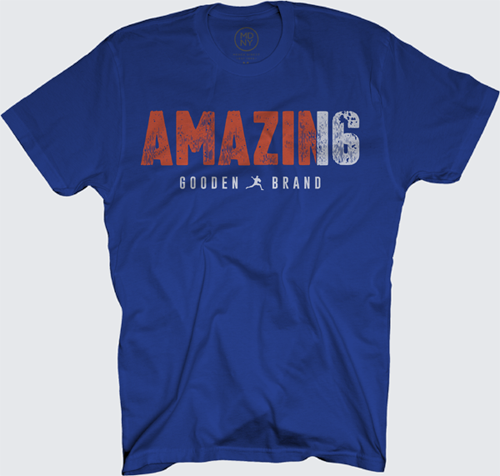
MMO: Talk a bit about the Gooden Brand. How did that start and what are you hoping to accomplish with it?
Dwight: That’s more of my son’s thing and he started it, Dwight Jr. He’s very creative and he came to me and said, “Dad, this would be great to do.” And actually this year we’re having it at Modell’s.
It’s just something that he started as a fun thing but now he’s trying to do it where he can raise money and half the money goes to charity, to help those who need second chances. Whatever those second chances might be whether it’s finances, drug abuse, or what have you. Just helping others and that’s what it’s all about. Putting a smile on a stranger’s face and that’s the way he was raised.
It just started off as something that was a fun project for my son and now it’s turning into something big and I’m very proud of him for starting it and I’m just happy to be a part of it and help support it.
MMO: I can’t thank you enough for your time today, Doc. It was an honor getting to speak with you.
Dwight: Thank you. My pleasure, buddy.
Follow Dwight Gooden on Twitter, @DocGooden16
For Gooden merchandise, visit: www.goodenbrand.com


